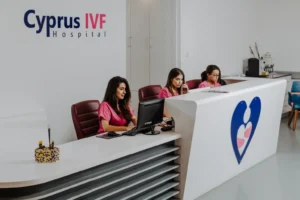Patients looking for IVF treatment abroad have many options when it comes to choosing the country where they want to be treated. As you might know, Spain is a very popular IVF destination, often chosen by many patients who, in addition to high medical standards, receive the opportunity to combine treatment with leisure.
However, apart from Spain, there are also other interesting and noteworthy countries where patients can combine treatment with the possibility of shorter or longer holidays. One of the most popular countries is Greece. Due to the number of specialized IVF clinics, the vast experience of doctors specializing in IVF treatment, liberal law, the availability of various treatment techniques and affordable treatment costs – Greece is a great choice for many patients from Europe and other continents.
What makes Greece a popular IVF destination?
1. Experienced doctors, often trained abroad, e.g., in the UK, Germany or the USA.
2. Patient-friendly IVF law
3. Anonymous donation of eggs and sperm
4. A large base of egg and sperm donors of various ethnicities
5. Specialized private clinics in popular regions of Greece
6. Weather that, regardless of the season, is perfect for recharging your batteries, especially in such popular places like Athens, Thessaloniki or Crete.
Availability of IVF treatment in Greece
There are around 40 IVF clinics in Greece, however, keep in mind that most of them mainly treat local/national patients. Still, clinics that accept patients from abroad are properly prepared for this. They provide the support of doctors and patient care teams who speak foreign languages and have experience in treating patients from abroad. Greek clinics receive a special license allowing them to treat patients with methods of assisted reproduction. Currently, licensed clinics can be viewed on this official website: Licensed In Vitro Fertilization Units (IVFU) & Cryopreservation Banks (CB).
Patient’s age
In Greece, for many years, the maximum age of the patient used to be 50. However, after the COVID-19 pandemic, the situation changed – the age was extended to 52. Currently, according to the Article 3 of Law 4958/2022, clinics can treat patients up to 54 years of age – but patients should ask the clinic directly – whether this option is possible.
Egg donation in Greece is general legally permitted and protected, it is allowed for singles and unmarried couples as long as women are under 50, there’s no upper age limit for men, and it’s anonymous.
Dr Elias Tsakos, medical director at EmbryoClinic explains
Relationship with a partner
In Greece, it is legally possible to treat married couples and single women. Treatment of same-sex female couples with donor eggs and donor sperm is not permitted by law.
IVF treatments available in Greece
In Greece, patients have the opportunity to use all modern IVF methods and techniques, including: PGT-A – embryo preimplantation diagnostics, ovarian rejuvenation, embryo monitoring and many others.
IVF with donor eggs in Greece
Greece has become a popular destination due to the large availability of egg donors of various races/ethnicities, and reasonable treatment costs – lower than in Spain.
Anonymous egg donors in Greece
According to the law, the egg donor remains anonymous and the patient who receives eggs from the donor has no right to know her identity and appearance. The donor is selected for the recipient on the basis of visual characteristics – the so-called ‘phenomatching’.
One of the reasons why Greece has become a popular country among patients is precisely the anonymity of donors. Patients from the UK and Australia often look for treatment options in countries where egg donors remain anonymous. Greece is a multicultural country; the available donors can be of Caucasian, Arab, Indian or other origin. However, this is not a rule and we recommend you ask the clinics directly what donors they have in their database.
IVF treatment costs with donor eggs in Greece
The cost of an IVF program with donor eggs in Greece is approximately €4,200 – €6,000 and covers the basic elements of the program preparation, visits, basic scans, donor oocytes and donor compensation, ICSI, blastocyst culture, and embryo transfer.
IVF treatment costs in Greece
The costs of IVF in Greece are moderate – ranging between the cheapest and most expensive countries in Europe. Due to its moderate cost of treatment, Greece is a good choice for many patients who are going abroad due to the high cost of treatment in their home country.
IVF with own eggs in Greece
The cost of IVF with your own eggs in Greece averages around €2,500 – €3,500. Such IVF with own oocytes program covers basic treatments and techniques including preparation, visits, basic scans, egg retrieval and general anaesthesia for the procedure, ICSI, blastocyst culture, and embryo transfer.
Embryo donation in Greece
The cost of a donor embryo program in Greece averages around €3,500 – €6,000. Costs include 1-2 embryos – usually at blastocyst stage and the embryo transfer.
Egg freezing in Greece
Women who think about freezing their eggs face average costs between €2,500 – €3,000. These costs include preparation, visits, basic scans, egg retrieval and general anaesthesia for the procedure, oocytes vitrification and one year storage. The example costs above are given as average values showing the cost range including basic services, techniques and procedures that enable the realization of one IVF cycle.
Depending on the region and other factors, patients may find cheaper and more expensive clinics in Greece. However, the use of the cheapest clinic may not always be the optimal solution. Patients should rather look for clinics with average treatment costs – rather than the cheapest ones. The above information on treatment costs is based on IVF abroad – patient’s guide.
The pros and cons of IVF treatment in Greece
The pros and cons of IVF treatment in Greece involve a range of considerations. It’s important to weigh both the advantages and potential challenges before making a decision.
Pros
- Liberal IVF law
- The maximum woman’s age – 54 years old
- High availability of egg donors
- Possibility of using modern treatment techniques
- A large group of doctors educated abroad – e.g., in the UK and Germany
Cons
- Most clinics treating patients from abroad are located in Athens, Thessaloniki and Crete
- Egg and sperm donation is anonymous
IVF treatment in Greece for patients from the UK
The staff at most of the clinics that specialize in treating patients from abroad speak English – this applies to non-medical and medical personnel – including doctors and embryologists. Clinics have experience and can advise on specific aspects of treatment that may prove problematic when the patient returns home – to the UK. These issues include, but are not limited to, purchasing drugs for hormonal stimulation, performing hormonal tests, and other services that are necessary for the next stages of treatment.
Clinics are also aware of the availability of prescription drugs in the UK, and also of different drug names – which may obviously differ between Greece and the UK.
Not without significance is also the very good availability of flights from the UK to Greece – especially to Athens.
Many clinics in Greece cooperate either with doctors or with clinics in Great Britain. As a result, they offer patients a very good organization of treatment and save time and money.
IVF treatment in Greece vs IVF in the UK?
When comparing IVF treatment in Greece to that in the UK, several key differences emerge. Understanding these differences can help individuals make informed decisions based on their specific needs and circumstances.
- Costs in Greece are much lower than in the UK
- Better availability of egg donors
- ICSI is part of almost every IVF program
- Better availability of the so-called “IVF add-ons” – and a very large clinical experience in their use for individual groups of patients.
IVF add-ons, generally in Greece are much cheaper than in the UK. Examples of IVF costs and additional procedures in Greece:
- Medical consultation: €100 – €250
- Sperm freezing: €300 – €350
- Embryo monitoring (all embryos within a cycle): €350 – €500
- Blastocyst culture: €400 – €500 included in basic packages in most of the IVF clinics
- Vitrification of (remaining) embryos and storage for 1 year: €400 – €900
- Frozen embryo transfer (surplus embryos): €950 – €1,400.
Final thoughts
Many clinics in Greece specialize in treating patients from abroad. Patients coming from the UK, Germany, Italy, Australia, the United States and many other countries are accepted in Greek clinics. If you are looking for IVF treatment abroad – it is worth researching Greece and checking what it has to offer. For many years in Greece there used to be a maximum age for female patients – 50 years old, which now has been raised to 54 years old – as a result, the number of patients in Greece could increase significantly.








